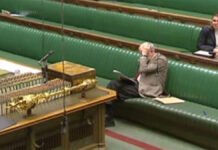Democracy’s Struggle: The Gatekeepers
In the intricate realm of democratic reform within trade unions, the path to change is often riddled with obstacles and gatekeepers. It begs the question: Who holds the keys to transformation? Are their missteps a result of incompetence or deliberate hindrance of motions for democratic change they deem unfavourable?
A recent incident involving Unite the Union’s Rules Conference sheds light on these complexities. An amendment proposing a shift from the first-past-the-post voting system to a single transferable preferential voting system for General Secretary became the focus of these gatekeepers.
The proposed preferential voting system allows voters to rank candidates in order of preference, with the candidate receiving over 50% of the votes being elected. If no candidate achieves this majority, a redistribution of votes based on indicated preferences takes place until a candidate secures an absolute majority.
The supporting argument for this rule change was compelling. It would encourage candidates to seek not only the votes of their own supporters but also the second and third preferences of others. This would reduce the need for negative campaigning and reward policies that are popular among a broad range of members. It would also provide members with a broader selection of candidates without the need for them to stand down to avoid “vote splitting” across multiple candidates. Moreover, it would reduce tactical voting as members could vote for their first choice without the fear of wasting their votes.
If this rule change had been accepted, it could have had far-reaching implications for proportional representation in general elections. Unite the Union is the largest trade union in the UK, with over 1.4 million members. Its influence extends far beyond the workplace, with many of its members also active in local and national politics.
By adopting an Alternative Vote system, Unite could set an example for other organisations and political parties to follow, potentially leading to a fairer and more representative electoral system across the country.
The AV system is often seen as a stepping stone towards proportional representation, as it allows voters to express their preferences for multiple candidates, rather than being limited to just one.
However, the motion was stopped by the gatekeeps ‘The Standing Orders Committee’.
The Standing Orders Committee, responsible for overseeing conference proceedings, deemed the amendment out-of-order. Comprising delegates from each region, the committee’s role is crucial in maintaining order and adhering to established procedures. Yet, questions arise about the committee’s decision-making process and the influence it wields over reform initiatives.
The committee cited legal reasons for ruling against the amendment, claiming that it introduced a preferential voting system inconsistent with trade union legislation. However, the Trade Union and Labour Relations Act of 1992 explicitly allows for the single transferable vote system under certain circumstances.
Notably, other unions such as RMT and NEU utilize this voting system for electing their general secretaries.
Speculations were also raised regarding the ruling being influenced by legal concerns and government control over internal trade union elections. It is essential to clarify that the government does not directly control such elections. Each trade union must appoint an independent scrutineer to oversee ballot conduct and ensure accurate vote counting, as mandated by trade union legislation. Moreover, the choice of voting system remains within the purview of the union.
Following an appeal, the Standing Orders Committee acknowledged its error and recognized the amendment’s validity. However, due to the delayed response in addressing the appeal, there was insufficient time for thorough assessment, considering its implications on other rule book sections, election procedures, and consultation with CIVICA. Consequently, the request was made to remit the amendment for further evaluation by Unite’s Executive Council, with a commitment to wider membership consultation.
The risks associated with not remitting the amendment are significant. The Executive Council may reluctantly oppose the amendment and recommend conference opposition. As outlined in the Unite Rule Book, the Executive Council can amend rules between conferences, but any changes must be ratified by the next Rules Conference.
The episode surrounding the STV amendment reveals the complexities of democratic reform within trade unions. The gatekeepers of change, represented by bodies like the Standing Orders Committee, hold considerable influence over the direction and implementation of reforms. Balancing the need for efficient decision-making with careful consideration of democratic principles remains an ongoing challenge.
As trade unions strive for more inclusive and participatory governance, the difficulties encountered in navigating the path to reform highlight the importance of transparency, accountability, and open dialogue. The journey towards a more democratic union landscape requires addressing the concerns surrounding gatekeepers, ensuring fair processes, and engaging the collective wisdom and perspectives of the membership.
Only then can trade unions truly embody the principles they advocate for—equality, representation, and a genuine voice for all workers.
Help Us Sustain Ad-Free Journalism
Sorry, I Need To Put Out the Begging Bowl
Independent Journalism Needs You
Our unwavering dedication is to provide you with unbiased news, diverse perspectives, and insightful opinions. We're on a mission to ensure that those in positions of power are held accountable for their actions, but we can't do it alone. Labour Heartlands is primarily funded by me, Paul Knaggs, and by the generous contributions of readers like you. Your donations keep us going and help us uphold the principles of independent journalism. Join us in our quest for truth, transparency, and accountability – donate today and be a part of our mission!
Like everyone else, we're facing challenges, and we need your help to stay online and continue providing crucial journalism. Every contribution, no matter how small, goes a long way in helping us thrive. By becoming one of our donors, you become a vital part of our mission to uncover the truth and uphold the values of democracy.
While we maintain our independence from political affiliations, we stand united against corruption, injustice, and the erosion of free speech, truth, and democracy. We believe in the power of accurate information in a democracy, and we consider facts non-negotiable.
Your support, no matter the amount, can make a significant impact. Together, we can make a difference and continue our journey toward a more informed and just society.
Thank you for supporting Labour Heartlands












